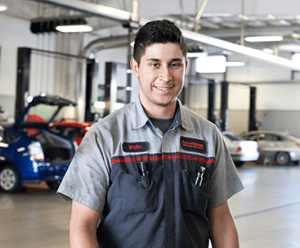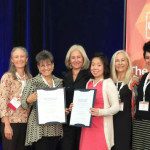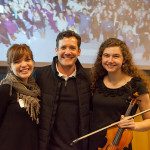Under the hood with McCord’s Toyota
Clark’s T-TEN Toyota technician training exceeds business expectations, grads land good-paying jobs

Kerrie Keesee, service manager at McCord Vancouver Toyota, believes Clark’s auto tech program stands head and shoulders above the rest.
Veteran professional auto technicians can spend years, even decades, trying to pass a series of advanced industry tests to gain their Automotive Service Excellence certifications that put them ahead of their peers on the job.
It took Clark College student Irvin Ortega less than two years.
In fact, Ortega’s skill level is so advanced because of his education that he can diagnose and address problems at the same or higher level than the employees he worked with during his internship at a local dealership.
“It’s kind of weird to see the difference between somebody like us and somebody that came off the street that has years of experience, but we’re still right up there with them,” Ortega said, adding his skill level is at or above many of the tenured technicians he works with today.
Ortega, who graduated in June 2015 from the Toyota Technician Training and Education Network program (T-TEN) at Clark College, passed nine certification tests, including one of the toughest—the L1 test—that focuses on auto diagnostics.
“The L1 test is considered the crown,” Dave Griffin, shop foreman at McCord’s Vancouver Toyota where Ortega interned, said. “We’ve got technicians who have been technicians for 20 years who struggle with the test. It’s not an easy thing, but it means that you’re up-to-date on what’s currently in the marketplace. Basic auto technology hasn’t changed, but the advanced technology has.”
Ortega’s success can be attributed, at least in part, to recent improvements in Clark’s T-TEN program. About two years ago, the college became the first college in the Pacific Northwest to achieve accreditation in Toyota’s rigorous training program.
T-TEN has existed at Clark for about 20 years, but the recently revamped Toyota T-TEN training program is already showing positive results, according to Toyota and Clark officials.
“Ortega is a trailblazer in the industry,” McCord’s service manager Kerrie Keesee said, noting that Ortega was the first graduate of the newly revamped T-TEN program at Clark and the first to pass all of the Automotive Service Excellence (ASE) tests.
“They’re like the cream of the crop, the technicians who have this education,” Keesee said.
Ortega performed jobs at Toyota as an intern that traditionally only technicians of a high caliber performed, such as diagnostic work on hybrids and recall orders, where he found out what caused it and fixed the problem, according to Keesee.
Clark College’s program prepares students for the highest level of technician work, according to Mike Godson, Clark’s Automotive Technology instructor. A large portion of the hands-on coursework focuses on learning diagnostics. Students have to figure out the problems and question why the issue even occurred in the first place.
“It’s not just discovering that a head gasket is no good, it’s determining what caused it to go bad,” he said.

Irvin Ortega ’15 performed jobs at Toyota as an intern that traditionally only techs with years of experience performed such as diagnostics on hybrids and recall orders.
Big Demand
In 2008, Toyota started looking at its T-TEN programs across the country as the vehicle manufacturer struggled to find qualified technicians to hire fresh out of college.
“They discovered many problems that needed to be addressed,” Godson said.
Toyota worked with colleges to develop new standards and curriculum that matched what the industry sought. Having a thorough understanding of all electrical components of an automobile, for example, and not simply components like lighting or audio, was revised.
New accreditation standards for colleges were announced by Toyota in 2010. Toyota worked with colleges to create a network in which instructors share ideas and address concerns.
“It’s important to remember this is a partnership. Toyota doesn’t just give us everything we ask for. We respond to what the community needs and what is in the best interest of our students,” Godson said.
Advancing students to the level that Toyota and other dealers in the region want takes time. Higher education institutions can’t graduate them fast enough. Furthermore, it’s no surprise that the automotive industry expects qualified technicians.
“Without exception everybody is saying they’re struggling to find enough job-ready service technicians for their dealerships,” Rick Lester, McCord’s Vancouver Toyota technician development manager said.
“Clark students can make an average of $10 an hour when they start their internships through the program,” said Jason Crone, automotive instructor, T-TEN coordinator and recruiter. Crone sets students up with jobs at dealerships across Oregon and Washington before they begin the T-TEN program. By the end of the second year in the program, students often earn up to $18 an hour.
The goal of the program is to train students to become master technicians, who make $26 to $28 an hour and advance to senior master technicians who can earn $80,000 to $120,000 a year, according to Crone.
“This is a career with massive growth potential,” he said.
The program has 100 percent job placement for those who complete the program and nearly 75 percent of the students make it through, according to Crone. Those who don’t, however, still find work as technicians at dealerships.
The relationship between the car industry and Clark is a shining star in the region. Strengthening the curriculum and placing graduates in jobs will continue to be the priority. McCord’s Vancouver Toyota, in collaboration with other regional dealerships and Clark officials, continuously work together to spark interest and recruit students.
~~~~~~~~~~~
Article by Shelby Sebens, a freelance journalist based in Portland, Ore. The article first appeared in the summer 2015 edition of Partners Magazine. Sebens writes for Reuters and various local media outlets. She also teaches digital journalism at Clark College and has a master’s in public affairs reporting.




